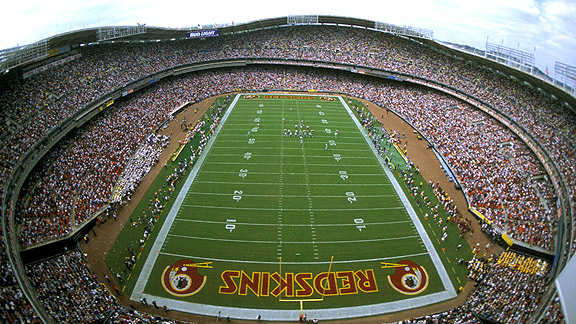The potential for a Washington Redskins stadium at the RFK Stadium site is drawing backlash in some circles, leaving more questions about an already uncertain proposition.
Home to the Redskins from 1961-1996, the venerable RFK Stadium (above) is expected to be demolished in the coming years. The Redskins, meanwhile, are exploring new stadium options as they approach the 2027 expiration of their FedEx Field lease. There has been hope among some officials–including D.C. mayor Muriel Bowser–that an agreement could be struck to build a new Redskins stadium at the RFK site, allowing the team to return to the District from suburban Prince Georges County, MD while providing a long-term plan for a sprawling site with strong access and room for surrounding redevelopment.
Any potential Redskins stadium at the RFK site would have numerous hurdles to clear, however, and local opposition to the idea is surfacing. Councilmembers David Grosso and Charles Allen are expressing their opposition, questioning the economics of providing land and infrastructure for an NFL venue and whether it is a poor use for the RFK Stadium site. More from WTOP:
Some of the stadium’s biggest opponents are not necessarily those you might expect. Councilmember David Grosso (I — At Large) worked under former D.C. Councilmember Sharon Ambrose as a clerk on D.C.’s Economic Development Committee, where he was part of the team that helped pave the way for baseball’s return to the District. Ward 6 Councilmember Charles Allen just helped oversee the completion of another major sporting venue in his ward, with the completion of Audi Field last summer.
The mayor’s office described any potential NFL stadium project as a D.C. United-type deal, in which the city would provide the land and build the infrastructure, while the team would build the stadium. But both Allen and Grosso are of the mind that an NFL stadium on the RFK site is bad for both the city and the local residents, and provides none of the economic boost often credited to projects like these.
“It’s just not a good use of our land and our resources and I think it’s a really wasted opportunity for what our city truly needs,” Allen told WTOP. “We’re in an affordable housing crisis in our city, and here we have an opportunity to extend our neighborhoods down to the Anacostia River with new housing.”
“I also don’t think that a football stadium is a good investment for the jurisdiction,” Grosso told WTOP. “I’ve read some studies on other cities — it doesn’t generate the type of economic impact that you would like to see from an investment this big. So I don’t support the city spending the kind of money it’s going to take, even if it’s just the infrastructure.”
Local reception will be one area to watch as discussions of redeveloping the RFK Stadium site continue, but there are other complications in play. The city has control of the RFK Stadium site under a lease with the National Park Service that expires in 2038, and that agreement contains very specific language limiting the site to a stadium, or public and recreational uses–providing hurdles to any commercial development surrounding a new Redskins facility. Congressional Republicans pushed late last year to add a provision to a spending bill that would extend the city’s lease and lift restrictions on commercial development at the site, but it appears to have since fizzled out with the Democratic party taking control of the U.S. House of Representatives.
For proponents, however, RFK Stadium is likely to be considered the most viable site for a new Redskins facility because it offers easy access and room for surrounding development, something that very few sites in the District can claim. RFK Stadium’s demolition has also become increasingly inevitable, given its aging condition and that its last major sports tenant–MLS’s D.C. United–finished play there in the fall of 2017 and has since opened Audi Field in the District’s Buzzard Point neighborhood.

